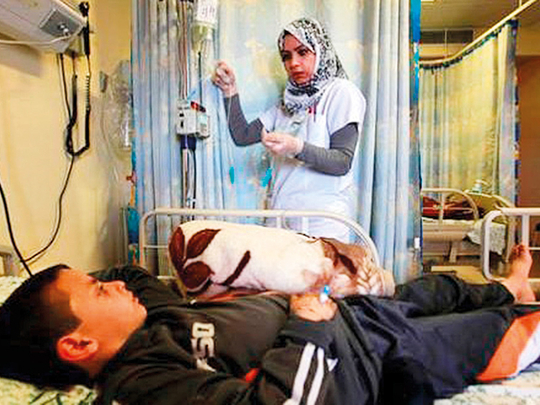
Ramallah: Vital medicines in Gaza are mostly out of stock amid a crackdown on Hamas-ruled Gaza.
Last month, Palestinian President Mahmoud Abbas vowed a string of ‘decisive measures’ intended to pile economic pressure on Hamas, which has ruled Gaza since 2007, in order to weaken its grip there.
Since then, the Palestinian unity government began to cut off financial assistance to Gaza.
It has slashed the salaries of government employees in Gaza by one-third, refused to pay Gaza’s power bill and halted transfers of medical equipment and medicines.
The Gaza Health Ministry says it has not received medicines from the Ramallah-based Palestinian government for more than one month and more than 175 medicines are now completely out of stock.
Analysts warned at the time, the crackdown would inflict an ‘unprecedented crisis’ on Gaza’s two million residents.
Muneer Al Bursh, who heads the Pharmaceutical Division at Gaza Health Ministry, confirmed that cancer medications are completely out of stock, as well as special milk for infants.
“Gaza has a right to these and other medications, which have either been donated or bought with Palestinian public funds,” he told Gulf News.
Medications for kidney failure and thalassaemia were also in short supply, said Al Bursh.
The Palestinian government says medicines are being withheld because Hamas has failed to transfer health care fees of over 100 million shekels, collected from Gaza residents, to the health ministry.
Palestinains living in Gaza have been under a crippling Israeli-imposed siege since 2007, when Hamas took over control there.
For the past two months, the consensus government has deducted 30 per cent of the salaries of more than 40,000 Gazan public servants, and observers believe that the consensus government will soon totally suspend the payment of these salaries.
Gaza has experienced power cuts of up to 18 hours a day, and Hamas authorities now asking the government to sell them electricity after deducting relative fees and taxes.
They also have offered to to buy diesel needed to operate the territories’ only power station at a rate of 2.5 shekels a litre, but the government wants them to pay 5.5 shekels per litre.
The power cuts have wreaked havoc on Gaza’s environment as sewage treatment plants struggle to keep up with the inflow of sewage.
The plants, as well as everyone else in Gaza, only has around 3-4 hours of electricity supply a day which is not enough to process the sewage of Gaza’s residents. As a result, untreated sewage water is being dumped into the ocean, posing dangerous health risks for residents as well as the potential devastation of fish in the area, which could put fishermen out of business.
The World Bank says they have received less than half the money pledged by donors to rebuild the Gaza Strip, after a brutal Israeli assault completely devastated Gaza in 2014.
This shortfall is one of the main reasons why the Palestinian economy is stagnating, with unemployment at 42 per cent in Gaza and 18 per cent in the West Bank.
Around 75,000 Palestinians in Gaza are still displaced from their homes as a $3.5 billion (Dh12.86 billion) effort to rebuild Gaza inches forward at snail’s pace. Israeli, Palestinian and international officials worry that the economic and humanitarian plight in the isolated coastal territory will fomment instability and that a new war may be only a matter of time.
Last year, the United Nations warned that Gaza may become uninhabitable by 2020 if there is no improvement in the economic situation.












